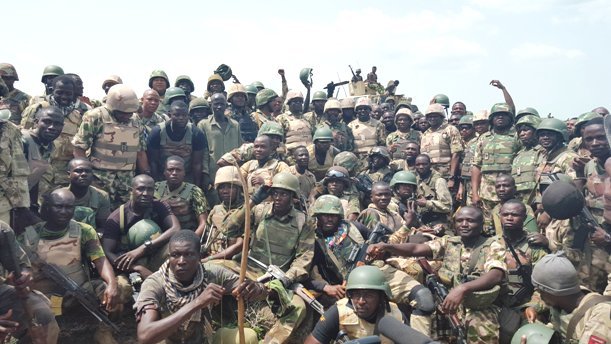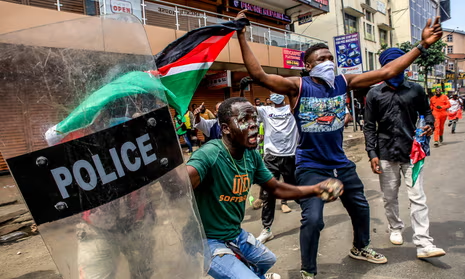As part of efforts to curb the security challenges bedevilling the country, the government has been urged to recruit more security personnel to help in the fight against insecurity.
The call was made in Lagos at a stakeholders roundtable meeting organised by Avocats SANs Frontiers France otherwise known as Lawyers Without Borders ‘SAFE’ Project.
Participants lamented that Nigeria’s total security statistics of less than 450,000 personnel guarding about 200 million people were grossly inadequate and could not guarantee efficient security architecture and protection of human rights.
Mrs Angela Uwandu, head of office ASF France in Nigeria, said that the SAFE project falls within the context of human rights violations including torture, extrajudicial killings and arbitrary detentions by security agencies in the country.
She said the prevalence of human rights violations in the country, especially with regard to frequent cases of arbitrary arrest and detention by security agencies. was one of the reasons for organising the event.
Uwandu said ” We believe firmly that the issues of human rights violations need to be tackled; they cannot be condoned. That is why the project is being carried out in Lagos, Enugu and Kaduna States. These are issues that bother not just on the Constitution, but on various International standards”.
According to her, the nation’s justice system is understaffed and riddled with delays.
“Our correctional facilities are overcrowded with the majority of inmates being pre-trial detainees, some held for many years without trial. The judicial system is highly defective especially due to impunity and disrespect of fundamental principles for a fair trial,”
Uwandu said. She expressed hope that the event would provide a template for how to hold rights violators accountable.
Uwandu said: “The essence of having all the security agencies, civil society, Human Rights Commission, legal aid counsel, the media and even the Nigeria Bar Association, is to see how we can collaborate to ensure that incidents of human rights abuses become minimal in Lagos state.
“When they occur we have to ensure that the perpetrators are held accountable, where there is no accountability, the impunity with which the human rights violations are perpetrated in Nigeria will continue”.
“We need to implement the existing law such as the Anti-Torture Act of 2017, to ensure that the perpetrators are prosecuted under the extant law”.
According to her, between 2019 to 2021, when the SAFE project started, in Kaduna, Enugu and Lagos, it had handled 70 cases of victims of torture, arbitrary detention and persons who would have been extrajudicially killed in the three states where the project is being implemented.
“So they are being offered free legal assistance on the project. We are doing it on a pro-bono basis. In Lagos alone, about three people have been released and 24 other cases are ongoing in various High Courts and the Federal High Court in Lagos.
“Beyond that, the project has trained so far 26 security personnel, drawn from Police, Army, Navy, Airforce, Department of State Security (DSS), Customs, as well as Journalists. Such training has also been held in Enugu and Kaduna states, but in Lagos, Civil Defense Corps and all the major security outfits we have in Nigeria.
“We are also going to train another batch of 25, officers in Lagos State at the end of the month, so it is important that such stakeholders meetings are held annually,”
Uwandu said. Also speaking at the event, Dr Abiodun Odusote urged stakeholders to be proactive when it comes to dealing with victims of torture “because at that time their physical and mental stage is that of accepting the guilt so that this abuse will stop”.
Another speaker, Nneka Anigbo from the National Human Rights Commission (NHRC), advised that the project should not only train security agencies regularly but should also collaborate with them and offer advice on lingering challenges.
“One thing is to train, another thing is to imbibe the training and practice in the course of their duties. “Some are trained and they will still stick to what they want to do, some are trained and practice the reforms. Police officers are also usually transferred and when it is time for follow up, you see different faces but then no knowledge is wasted.
“Though there is improvement in Lagos with security agencies especially the police who are the closest to the people, and again, the senior officers are more cooperative. It’s the lower ranks that are more difficult to work on”.
Dr Qasim Akinreti, former Nigerian Union of Journalists (NUJ) chairman said: “The focus for us is to see how our colleague, Pelumi Onifade will not die in vain.”
Onifade, a student journalist, was suspected to have been murdered by the police during the #EndSARS protests. According to Akinreti, for about seven days no one knew where the Taskforce took Onifade to upon his arrest in the line of duty as a journalist until his body was found at a mortuary in Ikorodu.
“That is a case of extrajudicial killing. An injury to one is an injury to all. It highlights the dangers we face as journalists. “When you are covering politics there is danger, when you want to unearth corruption, you are often vilified.
READ ALSO: NPA: Amaechi’s letter to Buhari led to Hadiza Bala Usman’s removal
When you are covering a crisis, we are easily the target. So, it’s not a rosy thing, the job must go on. We have to interrogate the process but we often feel the pinch.
But Pelumi must not die just like that. Who pulled the trigger? Has autopsy been carried out on him?”
Among other resolutions reached include the need for security personal to see themselves as part of the society, and see lawyers, journalists, and NGOs as partners amongst others.
The event was attended by representatives of the police, Army, NSCDC, NBA, DSS, Navy, NUJ, Legal Aid Council, NHRC and various NGOs such as Access to Justice.













